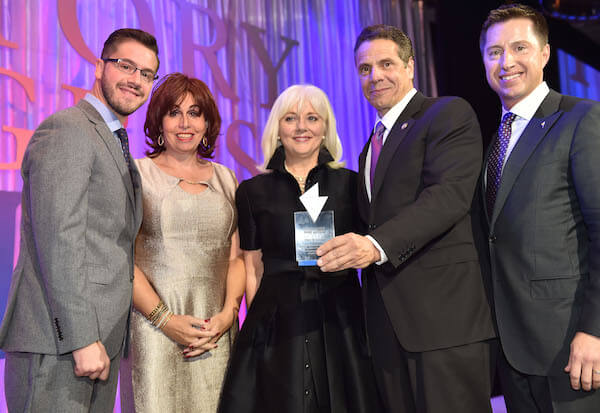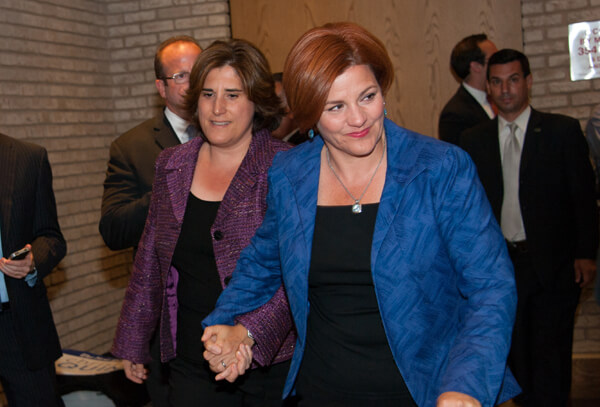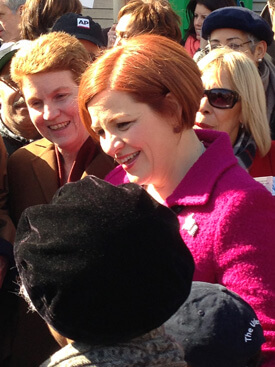Workers from the Pleasure Chest’s two Manhattan stores celebrate their winning representation by the Retail, Wholesale and Department Store Union. | RWDSU
In a unanimous vote, workers at the two Manhattan locations of the Pleasure Chest chose to join the Retail, Wholesale and Department Store Union (RWDSU). Pleasure Chest, which sells sex toys and related paraphernalia as well as offering workshops, has locations on Seventh Avenue in the West Village and on Second Avenue on the Upper East Side, plus other stores in Chicago and Los Angeles, which were not part of the union drive.
RWDSU’s success in organizing workers at the local Pleasure Chest came in the wake of the successful unionization of Babeland, another sex toy purveyor, with locations on the Lower East Side, in SoHo, and in Park Slope.
According to a release from the union, the Pleasure Chest’s Manhattan employees — which one of them estimated to number 15 or 16 — are “predominately LGBTQ and women.” The vote to unionize came on June 29, with the National Labor Relations Board certifying it on July 7.
Unanimous vote from sex retailer’s two Manhattan locations after owners’ pushback
According to several employees, sensitivity to the concerns of women and transgender employees — as well people of color — factored into their thinking as they considered unionizing.
Sloan Eckhardt, a transgender employee of four years who prefers the pronouns they and them, said the company uses a 360-degree employee evaluation process that allows feedback to go between workers and managers in all directions. However, Eckhardt said, managers had problems “listening to us and taking responsibility for their decisions.”
Workers gave feedback, they told Gay City News, but, “It was not getting us where we wanted to be.”
Eckhardt described themself as having a masculine presentation, but said, “I noted the way my feedback was listened to versus that from people of color and more feminine employees.”
Managers, they said, were willing to follow up on feedback on certain issues, but were not responsive when it involved “unconscious bias, the front door not being ADA-compliant, or spending money.”
Acknowledging that the Pleasure Chest ownership and management is heavily LGBTQ itself, Eckhardt complained that their values are typical of “white liberal gay and lesbian people” but there is a gap between those values and management’s actions.
LeNair Richardson, a gay man who is also a four-year Pleasure Chest employee, echoed Eckhardt’s contention that management, while welcoming feedback, seemed far less interested in acting on it. He added that he witnessed instances of people of color working there being subjected to unfair treatment.
Richardson said he formerly worked in the gay porn industry, which he left because of the prevalence of what he termed “wrong messaging” about people’s bodies. Hoping to find a “more positive” end of the sex industry, he became concerned that similar attitudes were emerging at the Pleasure Chest.
“One manager told me, ‘You’re an at-will employee. I could fire you, but you’re here because I like you,’” Richardson recalled. “Sometimes the way I was spoken to was to undermine my intellect.”
The belief on the part of employees that they needed to strengthen their voice and their power in their dealings with management apparently only increased when the Pleasure Chest brought in consultants to assist in beating back the organizing effort.
Referring to the work of those consultants, Stuart Appelbaum, RWDSU’s president, in the union’s release, said, “The harassment and categorically tone-deaf anti-union campaign lead by Jackson Lewis and Labor Relations International that the workers at Pleasure Chest faced is an outrage — I am proud that the RWDSU will be at the bargaining table to ensure that these workers never face that type of horrific transphobic behavior by their company again.”
According to Eckhardt, Richardson, and a third employee, Nico Fuentes, the two consultants presented a series of five mandatory “information sessions” — a management prerogative allowed under federal labor law — that seem to have badly misfired. Richardson said that the consultants were so indifferent to the gender identities of those they were addressing that they flat-out conceded up front, “We’re going to misgender some of you.”
Fuentes, quoted in RWDSU’s written release, said, “The company and their union-busting buffoons’ blatant disregard for our gender identities during the organizing campaign only further demonstrates the need for a united voice, which is why we’ve decided the RWDSU will be a strong partner in securing safety trainings and protocols when harassment by the company or by the public takes place.”
Eckhardt explained that on-the-job safety trainings are particularly important in a sex-related retail setting, where some customers may feel that the liberated atmosphere frees them from observing any rules or showing any respect for employees. Co-workers, they said, especially transgender women, were the objects of harassment, even groping. In one instance, Eckhardt said, a trans women was spit on. The company’s response, they said, amounted to a one-off safety training that fell short of what employees needed to protect themselves.
Eckhardt also suggested that the consultants showed surprising political tone-deafness when speaking to LGBTQ workers who live in Manhattan. President Ronald Reagan’s take-down of the air traffic controller’s union in the early 1980s, for example — at a time when he was ignoring the emerging AIDS crisis — was pointed to as a laudatory moment in labor history. While touted as “information sessions,” Eckhardt said, the consultants’ pitch had “a very clear bias from the get-go,” with basic facts misrepresented.
“They just wanted to harp on how different we were from Babeland,” Eckhardt recalled. “And they compared joining a union to gambling in Atlantic City. The anti-union campaign only solidified our commitment to organize.”
In the wake of RWDSU’s press release announcing the success of its organizing effort, Pleasure Chest pushed back hard in a blog on its company website.
“The Union would like to position the Pleasure Chest as blind to the conditions faced by our largely LGBTQ workforce and claim we have unfair labor practices and subject our workers to harassment,” wrote Sarah Tomchesson, the Pleasure Chest’s head of business operations. “While these claims make for attention grabbing headlines, arguably their main aim is to help bolster RWDSU’s standing on the national stage as a Union that is putting LGBTQ rights at the center of their efforts. This Union has only very recently begun to position LGBTQ protections as an organizing priority and their claims positioning the Pleasure Chest as an oppressive work environment are simply false. I argue that we have set the standard in our industry, not only in progressive policies and protections, but also in wages and benefits for decades, long before the Union began drawing attention to these issues.”
(Appelbaum, the RWDSU president, it should be noted, is an out gay man.)
Tomchesson pointed to the company’s pioneering role within its industry in establishing full-time schedules, offering health benefits and vacation time, establishing a gender identity nondiscrimination policy, and putting in place safety training. Compensation at the company, she said, is 25 percent above the industry standard and there is widespread promotion from within to management posts, with 86 percent of all managers identifying as LGBTQ.
Responding to RWDSU’s charge that the company engaged in union-busting efforts, Tomchesson noted that the Pleasure Chest’s hiring of consultants to lead meetings with employees was within its rights as an employer. Eckhardt, in fact, confirmed that, beyond the consultants’ efforts, Pleasure Chest did not act to impede organizing.
Tomchesson’s blog post was followed by a number of comments posted by employees lauding the company for its inclusive and progressive policies, though it’s unclear if any came from staff of the New York stores or if those posting hold management posts. One five-year employee identified himself as working in Los Angeles. A “nonbinary” employee voiced anger at RWDSU’s characterization of Pleasure Chest as “transphobic,” citing their own experience and noting the “high number of trans and nonbinary folx in upper management.”
In an email to Gay City News, Tomchesson defended management’s response to employee feedback, noting as examples its reporting of daily commission rates to enhance transparency and its revised inclement weather policy.
“The upcoming negotiation process will give us an opportunity to continue our longstanding efforts to revise our practices to better meet the needs of our customers and workers alike,” she wrote.
Neither Jackson Lewis nor Labor Relations International responded to requests for comment.



































